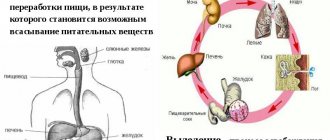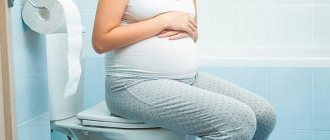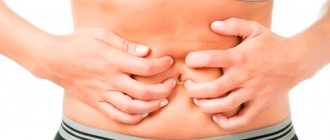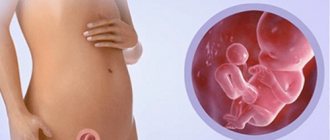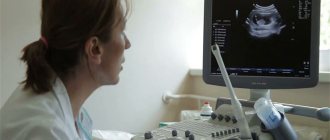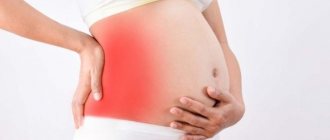Cause of pain during pregnancy
Feeling discomfort in the abdomen, many women begin to panic and become the object of increased attention from the doctor. Often, expectant mothers have nothing to worry about, but we should not exclude the development of various pathologies that can negatively affect the health of mother and baby.
That is why, if any unpleasant sensations appear in the stomach, you should immediately contact a specialist. Pain in the intestines during pregnancy can be caused by many factors. The main causes of abdominal discomfort are:
- various diseases of the digestive tract (intestinal colic and intestinal disorders);
- threat of miscarriage or premature birth;
- placental complications;
- diseases of the urinary system;
- surgical diseases;
- errors in diet;
- psycho-emotional stress.
Pathologies of the digestive tract
Colic and intestinal upset cause a lot of trouble during pregnancy. They are caused by fatty, hard-to-digest foods. With intestinal colic, there will be severe wave-like pain that begins in the lower abdomen.
In addition, the following signs can be noted:
- bloating, increased gas formation and seething;
- slight feeling of nausea, rarely vomiting;
- general weakness and malaise.
Intestinal colic can last from several minutes to several hours.
Intestinal upset also appears due to poor nutrition or as a result of the active proliferation of pathogenic microorganisms. Its appearance is especially typical in the first trimester of pregnancy, when a woman develops toxicosis and refuses to eat.
Improper functioning of the intestines can manifest itself in the form of pain in the stomach and intestines of varying intensity, upset stools mixed with mucus, false urges to empty the intestines, and painful sensations inside the anus. Treatment of stomach and intestinal disorders does not imply special therapy and goes away after a few days with normalization of nutrition and microflora.
Threat of miscarriage or premature birth
Characterized by constant or cramping pain in the lower abdomen. The name of the pathology depends on the stage of pregnancy. In addition, the following will be noted:
- bleeding of varying intensity from the genitals;
- pain radiates to the sacrum and lumbar area;
- uterine tone is increased;
- The cervix gradually begins to open.
If no measures are taken in time to relieve tone and stop bleeding, the pathological condition will end in miscarriage
In addition, fetal particles or blood clots may remain in the uterine cavity, which can pose a danger and cause infection. Therefore, curettage of the uterus will be a mandatory procedure in order to avoid complications.
Placental complications
Occurs in the event of partial or complete detachment of the placenta in the uterine cavity. This condition can appear as a result of various injuries, infectious diseases, severe toxicosis, etc. In this case, there is a threat to the unborn child as a result of impaired blood circulation and nutrition.
As a result of the pathology, the following symptoms appear: severe sudden pain in the lower abdomen, bleeding from the uterine cavity of varying intensity, disturbances in the condition of the fetus. If the detachment is of the central type, then there may be no bleeding. But with the progression of pathological progress, a threat arises to the life of the woman and her child.
Diseases of the urinary system
Often accompanied by spasmodic abdominal pain, which is typical for urolithiasis and renal colic. Most often, with these pathologies, pain radiates to the groin and thigh. If you have pain in the lower abdomen, you may suspect the development of cystitis.
Along with the unpleasant symptom, other signs will be present:
- cloudy urine, sometimes mixed with blood or pus;
- frequent urge to go to the toilet;
- pain and pain when emptying the bladder.
When diagnosing abdominal pain, all possible causes of the pathology should be taken into account.
Surgical diseases
Pathologies such as acute appendicitis cause acute abdominal pain even during pregnancy. The exact reasons why inflammation occurs are not fully understood.
Why does my stomach hurt at 40 weeks of pregnancy?
Along with sharp pain in the abdomen (the location depends on the stage of pregnancy), the following symptoms will be noted:
- nausea, vomiting, diarrhea appears;
- body temperature rises, but not higher than 38 degrees;
- general symptoms of intoxication (weakness, malaise, headache and muscle pain).
Appendicitis develops rapidly; if signs of inflammation appear, it is necessary to urgently go to the hospital. Treatment requires surgery.
Psycho-emotional stress
It has a negative effect not only during pregnancy. During this period, stress poses a particular threat and can provoke a miscarriage. In addition, overexertion negatively affects the functioning of the digestive tract.
During the period of emotional experience, vasoconstriction occurs and internal organs do not receive enough oxygen. Oxygen starvation and improper functioning of the gastrointestinal tract occurs. Symptoms of this condition may be: a feeling of nausea, sometimes the urge to vomit, flatulence, heartburn, diarrhea or constipation, changes in blood pressure, dizziness and headache.
If any unpleasant conditions appear, you must try to get rid of them as quickly as possible, because they can provoke the onset of serious deviations.
Without a complete examination, even a doctor will have difficulty telling you the exact cause of abdominal pain.
Basic methods for diagnosing intestinal problems in pregnant women
The future child puts forward new requirements for the diet. Whims arise, food preferences change dramatically, which irritates the digestive tract. Not having time to separate the food received, sweet and salty, fruit and dairy, incompatible things, the body reacts with intestinal disorders.
Another risk factor is hormonal changes. Progesterone relaxes smooth muscles, slows down the digestive tract, causing stagnation and pain. Factor number two is the growing uterus, squeezing the internal organs.
The main method of prevention to avoid treatment of the gastrointestinal tract is adherence to the diet and regimen. It is necessary to eat regularly without overeating, in small portions, excluding things that irritate the intestines. Alcohol, coffee, spices are excluded, salty and sweet foods are taken during periods of normal functioning of the tract. To avoid becoming a victim of stagnation, you need to maintain a positive mood, walk, and move moderately.
It is worth understanding that diarrhea and constipation are frequent companions of pregnancy; the obstetrician usually warns expectant mothers. Constipation occurs more often, diarrhea is less common and more dangerous. The very type of disorder signals a possible infection or poisoning. Pain on the left or right, accompanied by loose stools, indicates a lack of enzymes, worms, problems with microflora, infections, and nervous disorders.
Short-term disorders, periodic pain of low intensity, one-time attacks of diarrhea, nausea are a relatively normal phenomenon caused by temporary disruptions in the functioning of the body. There is no point in worrying about this.
Symptoms
If abdominal pain occurs during pregnancy, you should pay attention to even minor complaints from the patient. Sometimes it is possible to identify a disease without resorting to additional diagnostic methods.
It is especially worth emphasizing the nature of the pain and its location:
- by nature: spastic, stitching and aching;
- by intensity: weak, moderate and pronounced;
- by location: around the navel, lower abdomen, lateral areas, hypochondrium;
- by duration: fast-passing and long-lasting;
- by frequency: episodic and constant.
It is definitely worth considering other signs of the disease that do not relate to pain, since they are of considerable importance in making a diagnosis. A general and complete concept of the onset and development of the disease will be formed after considering all the signs of pathology.
Blood from the anus
Often, pain radiating into the anus during pregnancy occurs along with bleeding. The affected nodules transform. In some cases, bleeding from fissures may develop. For example, with persistent hemorrhoids.
A woman is prescribed treatment with natural rectal suppositories. These include the drug "Natalsid". It relieves inflammation, stops blood flow and itching in the rectal area.
Traces of blood on toilet paper should prompt a trip to the doctor
Anorectal bleeding is often one of the signs of hemorrhoidal disease.
But it may also indicate the presence of other chronic diseases:
- diverticulosis;
- malignant tumors;
- colitis (nonspecific and ulcerative).
Sometimes the symptoms of hemorrhoids mask other diseases, such as colorectal cancer or polyps.
All this suggests that any even subtle symptoms (intestinal discomfort, small amounts of blood) require careful diagnosis. Palpation, colonoscopy or irrigoscopy, rectoscopy, all these methods will help make an accurate diagnosis.
The main rule applies here! The slightest suspicion of inflammation or tumor requires a complete examination of the colon.
Drug treatment
The basis of any treatment is the use of special medications. With their help, you can get the desired result in a short period of time. Pregnant women should pay special attention when choosing medications and are recommended to take only those medications whose safety has been proven.
In case of emergency, specialists can prescribe the following groups of medications:
- antispasmodics;
- progesterone preparations;
- means to improve blood circulation;
- adsorbents;
- enzymes;
- probiotics and prebiotics;
- antibacterial drugs;
- herbal products.
For each patient, a medicine will be individually selected based on the characteristics of the body and the results of the examination.
Remember! Self-administration of medications (without a doctor's prescription) during pregnancy is unacceptable.
What functions does the intestine perform?
The intestines are part of the digestive system and are responsible for a number of important tasks:
- Suction. It is in the intestines that many vitamins and amino acids are absorbed. If this function is disrupted, the body will not receive enough nutrients.
- Enzyme production. Some substances necessary for normal digestion of food are produced in this part of the gastrointestinal tract and are released through the intestinal walls.
- Waste evacuation. During the digestion process, substances are formed that the human body does not absorb or waste that can harm it. They make up stool and are excreted through the intestines.
In addition, this part of the digestive tract is home to a huge number of microorganisms necessary for the normal functioning of the human body. These include bifidobacteria and lactobacilli, as well as E. coli.
In the process of life, they produce useful substances that ensure the normal functioning of the human body, for example, B vitamins, ethyl alcohol and lactase.
The baby in the womb is sterile; it receives its own microflora from the mother during and after childbirth. Therefore, it is so important that a pregnant woman’s body has a normal amount of bacteria and their correct ratio.
But studies have shown that in almost half of pregnant women the number of bifidobacteria in the intestines is significantly reduced. This threatens the unborn baby with dysbacteriosis. Often such children suffer from tummy pain and colic, behave restlessly and often cry.
The intestines perform several important functions in the body. It is located in the middle and lower abdomen, its structure is very complex. This part of the digestive system ensures the absorption of nutrients and the absorption of vitamins. Along the way, they produce the necessary digestive enzymes. The next important stage is the elimination of waste in the form of feces.
The intestines contain colonies of microorganisms that provide the appropriate stage of food digestion, including lactic acid bacteria. These bacteria supply the body with lactose, B vitamins, and also produce ethyl alcohol. With their help, fats, carbohydrates and proteins are broken down.
Photo of human intestines
It is necessary to maintain a normal balance of intestinal microflora, since the baby in the womb does not have its own bacteria. He receives them from his mother during childbirth and breastfeeding. During pregnancy, many women suffer from dysbiosis, which also affects the health of the unborn baby.
What to do if your stomach hurts during pregnancy
At the first appearance of abdominal pain, you need to perform the following simple measures:
- Abdominal pain at any stage of pregnancy causes anxiety and irritability. The first thing you need to do is calm down and normalize your emotions;
- contact your doctor or call an ambulance. Sometimes a telephone consultation helps to recognize the cause of discomfort;
- If other symptoms appear (diarrhea, constipation, etc.), pay attention to the duration of this condition. If the duration of diarrhea is more than 3 days and is accompanied by hyperthermia and vomiting, then emergency hospitalization is necessary (most likely it is an intestinal infection). In other cases, we are talking about physiological changes during pregnancy.
Any stress and overexertion can provoke abdominal pain of any intensity. In order not to aggravate the current situation, you should try to relax and calm down as soon as possible.
What causes stabbing in early pregnancy?
The attachment of the embryo to the wall of the uterus causes hormonal imbalance. The number of estrogens, progesterone, and gestagen increases. This provokes malaise, drowsiness, fainting, toxicosis, and body pain.
Long-term toxicosis damages the walls of the stomach and other parts of the digestive tract. Aching pain occurs.
Diseases not related to pregnancy may develop:
- appendicitis - an infectious and inflammatory condition of the appendix;
- exacerbation of peptic ulcer of the stomach and duodenum;
- relapse of pyelonephritis, nephrosis, glomerulonephritis;
- intensification of urolithiasis with the release of stones from the urinary tract to the outside, which is accompanied by acute pain and bleeding.
If pain attacks do not go away within a week, a comprehensive examination is prescribed. The patient is admitted to the hospital for conservation, eliminating the risk of miscarriage. They pay extra attention there. Treatment instructions from the doctor are followed strictly, dosages are not changed.
Special diet for pregnant women
To try to eliminate discomfort in the intestines, it is enough to slightly adjust your diet. It is very important to eat enough fiber-rich foods (fruits and vegetables, seeds, nuts, etc.) during pregnancy.
These substances help to quickly remove undigested food from the body and also prevent constipation and abdominal pain. Products such as grapefruit, orange, currant, plum, rose hips help reduce abdominal discomfort due to their high pectin content.
It is very useful to consume fermented milk products, but it is better to avoid fresh milk altogether in the early stages. The fact is that it can provoke painful sensations, irritating the intestinal walls, and bring a lot of discomfort.
In the absence of edema and other contraindications, you must drink at least 1 liter of liquid per day. Water helps soften and remove stool from the body. Potatoes baked in the oven, bread and cereals help increase intestinal volume and soften stool, which has a beneficial effect on the intestinal walls.
You should use dietary supplements with caution: they are effective for both diarrhea and constipation. Limit caffeine intake, as it increases intestinal motility and stimulates bowel movements. Caffeine is found in tea, coffee, hot chocolate, Coca-Cola, and energy drinks. If you follow simple rules, you can easily get rid of unpleasant symptoms and painful sensations in the intestines and abdomen.
Symptoms
Specific symptoms depend on what exactly caused the pain:
- When digestion slows down due to compression of the intestines by the uterus, the pain is localized in the central part of the abdomen. Due to poor removal of toxins, the condition of the facial skin worsens, acne and inflammation appear. There is general weakness and fatigue.
- Intestinal infections always have clear symptoms. These are nausea, frequent bouts of vomiting, constant thirst due to dehydration, and diarrhea. The nature of the pain is cramping. The same signs appear with food poisoning.
- A common symptom of non-infectious diseases is stool disorders. Constipation alternates with diarrhea. With ulcerative colitis, the stool may contain mucus and pus. With diverticulitis, attacks of pain persist for several days. Palpation of the affected area of the intestine through the abdominal wall increases discomfort.
Proctalgia
Crohn's disease causes bloody diarrhea.
Most often, the cause of this reaction is an old injury, as a result of which the pelvic muscles cramp.
Unfortunately, the time of the next attack of proctalgia is almost impossible to predict. Pain syndrome with this disease always occurs suddenly.
How is proctalgia treated? Diagnosis of this disease is carried out by surgeons and psychotherapists. It is these specialists that the patient should visit for consultation first. Treatment (usually consisting of medication) must also be prescribed by a doctor. The patient can only strictly follow his recommendations.
What is constipation?
As mentioned above, the level of progesterone in the body of pregnant women increases and, as a result, the intake of fluid from the intestines increases. This leads to constipation and pain in the intestines. Often, constipation does not pose a threat to the fetus, but it causes discomfort for the expectant mother and can cause serious complications. Against this background, hemorrhoids develop, bleeding from the rectum, and rectal fissures form. If constipation is accompanied by bloody stools, or stools do not occur for several days, you need to visit a gynecologist.
With a tendency to constipation, pregnant women, unfortunately, already at 4-6 weeks of pregnancy learn how the intestines hurt during early pregnancy . But in the first trimester, drug treatment is minimized and carried out only in cases where the benefit to the mother outweighs the risk to the fetus. The use of drugs that relax the intestines is strictly prohibited; they also weaken the muscles of the uterus, which can lead to involuntary abortion.
